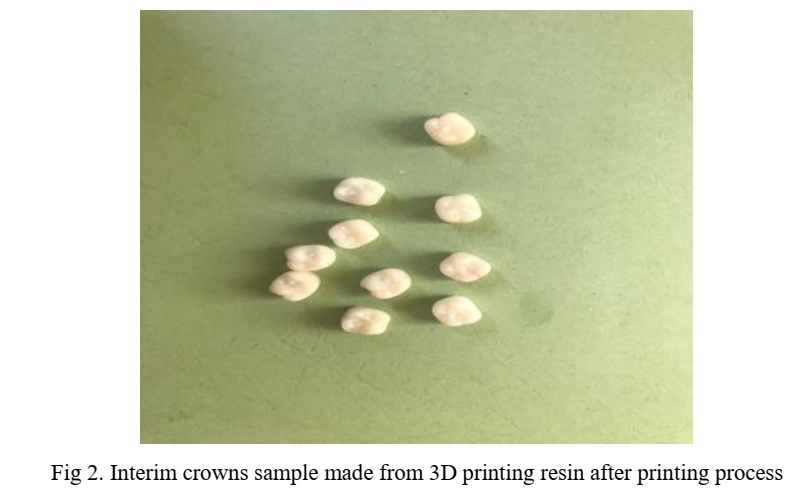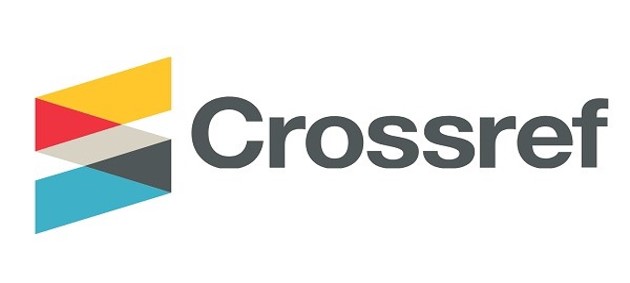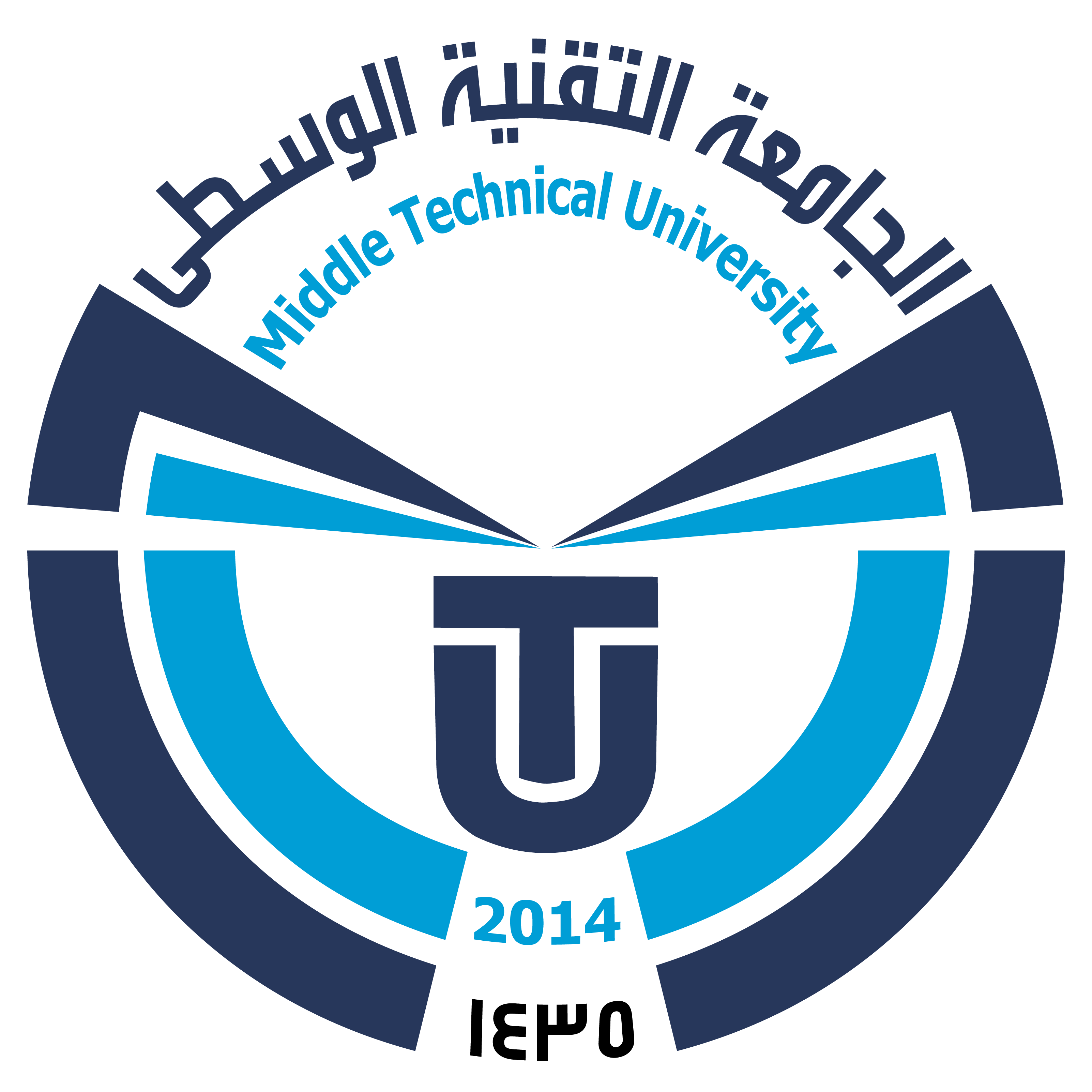The Effect of Thermocycling on Fracture Resistance of CAD- CAM and 3D Printing Provisional Prosthesis
DOI:
https://doi.org/10.51173/jt.v4i33.681Keywords:
3D printing, CAD/CAM, Fracture strength, Polymer materials, ThermocyclingAbstract
This study aims to assess how thermal cycling affected the fracture strength of temporary restorations made using additive 3D printing procedures and computer-aided design- computer-assisted manufacturing (CAD/CAM), subtractive (milling) methods.
For full coverage crowns, a dento form upper molar tooth was created. A second oral scanner digitally scanned developed model. Duplication of the metal dies was made using the master die (chrome cobalt alloy). A total of 40 samples were created and split into two groups: 20 were created using CAD/CAM technology with a (Bilkim) CAD PMMA disc and 20 were created using 3D printing with Asiga dentatooth resin. Thermal cycles (1250 cycles, 5-55 °C) were applied to 10 samples from each group. After that, a universal testing device determined the fracture resistance for each sample.
The mean with standard deviation values of fracture resistance were recorded for the milled group before thermocycling (560.50 ±83.581 newton) and after thermocycling (901.00± 311.598 newton) meanwhile the mean ± stander deviation value was recorded with the printed group before thermocycling (1972.50±399.181 Newton) and after thermocycling (2284.10±239.001 Newton), it was found that the printed group recorded statistically significant higher fracture resistance mean value than the milled group.
Provisional crowns constructed using the 3D printing technique showed higher fracture resistance compared to the temporary milled crowns.
Downloads
References
Ferro, K. J., Morgano, S. M., Driscoll, C. F., Freilich, M. A., Guckes, A. D., Knoernschild, K. L., Mcgarry, T. J. & Twain, M. The Glossary Of Prosthodontics Terms, 2017.
Miura, S., Fujisawa, M., Komine, F., Maseki, T., Ogawa, T., Takebe, J. & Nara, Y. Importance Of Interim Restorations In The Molar Region. Journal Of Oral Science, 19-0102, 2019.
Patras, M., Naka, O., Doukoudakis, S. & Pissiotis, A. Management Of Provisional Restorations' Deficiencies: A Literature Review. Journal Of Esthetic And Restorative Dentistry, 24, 26-38, 2012.
Abad-Coronel, C., Carrera, E., Mena Córdova, N., Fajardo, J. I. & Aliaga, P. Comparative Analysis Of Fracture Resistance Between Cad/Cam Materials For Interim Fixed Prosthesis. Materials, 14, 7791, 2021.
Ruse, N. & Sadoun, M. Resin-Composite Blocks For Dental Cad/Cam Applications. Journal Of Dental Research, 93, 1232-1234, 2014.
Yao, J., Li, J., Wang, Y. & Huang, H. Comparison Of The Flexural Strength And Marginal Accuracy Of Traditional And Cad/Cam Interim Materials Before And After Thermal Cycling. The Journal Of Prosthetic Dentistry, 112, 649-657, 2014.
Abdullah, A. O., Tsitrou, E. A. & Pollington, S. Comparative In Vitro Evaluation Of Cad/Cam Vs Conventional Provisional Crowns. Journal Of Applied Oral Science, 24, 258-263, 2016.
Abdullah, A., Muhammed, F., Zheng, B. & Liu, Y. An Overview Of Computer Aided Design/Computer Aided Manufacturing
Javaid, M. & Haleem, A. Current Status And Applications Of Additive Manufacturing In Dentistry: A Literature-Based Review. Journal Of Oral Biology And Craniofacial Research, 9, 179-185, 2019.
Zaharia, C., Gabor, A.-G., Gavrilovici, A., Stan, A. T., Idorasi, L., Sinescu, C. & Negruțiu, M.-L. Digital Dentistry-3d Printing Applications. Journal Of Interdisciplinary Medicine, 2, 50-53, 2017.
Karaokutan, I., Sayin, G. & Kara, O. In Vitro Study Of Fracture Strength Of Provisional Crown Materials. The Journal Of Advanced Prosthodontics, 7, 27-31, 2015.
Al-Atyaa, Z. T. & Majeed, M. A. Comparative Evaluation Of The Marginal And Internal Fitness Of Monolithic Cad/Cam Zirconia Crowns Fabricated From Different Conventional Impression Techniques And Digital Impression Using Silicone Replica Technique (An In Vitro Study). Biomedical And Pharmacology Journal, 11, 477-490, 2018.
Majeed, M. A. & Al-Adel, S. K." Evaluation Of The Marginal And Internal Fitness Of Full Contour Cad/Cam Crowns Made From Zirconia, Lithium Disilicate, Zirconia-Reinforced Lithium Silicate And Hybrid Dental Ceramic By Silicone Replica Technique (A Comparative In Vitro Study)". Journal Of Genetic And Environmental Resources Conservation, 4, 10-20, 2016.
Ibrahim, A., El Shehawy, D. & El-Naggar, G. "Fracture Resistance Of Interim Restoration Constructed By 3d Printing Versus Cad/Cam Technique (In Vitro Study)". Ain Shams Dent. J, 23, E14-E20, 2020.
Reeponmaha, T., Angwaravong, O. & Angwarawong, T." Comparison Of Fracture Strength After Thermo-Mechanical Aging Between Provisional Crowns Made With Cad/Cam And Conventional Method". The Journal Of Advanced Prosthodontics, 12, 218, 2020.
Suralik, K. M., Sun, J., Chen, C.-Y. & Lee, S. J." Effect Of Fabrication Method On Fracture Strength Of Provisional Implant-Supported Fixed Dental Prostheses". Prosthesis, 2, 325-332, 2020.
Lang, R., Rosentritt, M., Behr, M. & Handel, G. "Fracture Resistance Of Pmma And Resin Matrix Composite-Based Interim Fpd Materials". International Journal Of Prosthodontics, 16, 2003.
Digholkar, S., Madhav, V. & Palaskar, J. "Evaluation Of The Flexural Strength And Micro Hardness Of Provisional Crown And Bridge Materials Fabricated By Different Methods". The Journal Of The Indian Prosthodontics Society, 16, 328, 2016.
Bakke, M., June." Bite Force And Occlusion". In Seminars In Orthodontics Vol. 12, No. 2, Pp. 120-126, 2006.
Tahayeri, Anthony, Et Al. "3d Printed Versus Conventionally Cured Provisional Crown And Bridge Dental Materials." Dental Materials, Vol.34, No .2 Pp. 192-200, 2018.

Downloads
Published
How to Cite
Issue
Section
License
Copyright (c) 2022 Maab Qassim Hadi, Suha Fadhil Dulami

This work is licensed under a Creative Commons Attribution 4.0 International License.
















